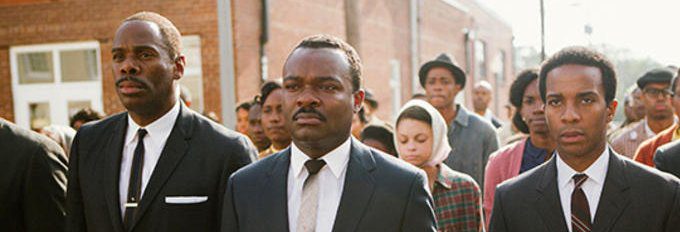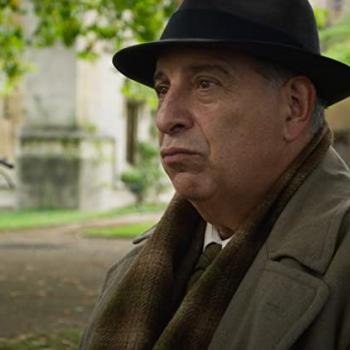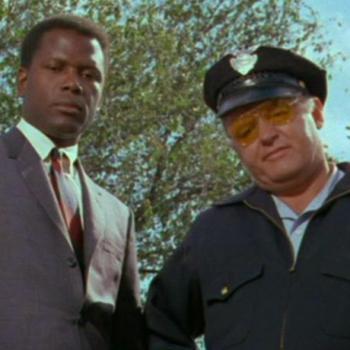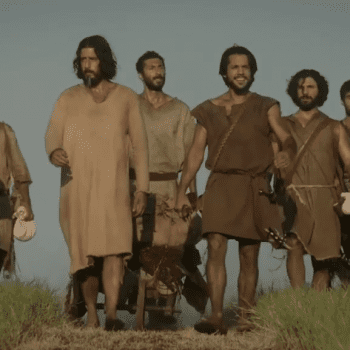The temptation when making a movie about a major turning point in history is to make it all about one person, usually a man, and to frame it as that one person’s great struggle.
Typical of this trend is one recent film about the formal abolition of slavery — and all the various politicians, power brokers and deal makers who made it happen over the course of a few weeks — that got released with a title, Lincoln, that pointed to the man at the top of the pyramid.
So it’s striking that Selma, the first major movie about Martin Luther King, Jr., points beyond its protagonist to the civil-rights movement as a whole, even in its title. (King has been profiled in a number of TV productions going back to a 1978 miniseries starring Paul Winfield, but I don’t believe he has ever been the main character in a theatrical film before.)
Instead of covering King’s entire life story, the way Spike Lee covered Malcolm X in his film of that name two decades ago, Selma looks at a narrow slice of time and treats it as a microcosm of sorts for the entire civil rights movement — and, in doing so, it pays attention to a number of less-famous figures who played a part in the movement’s success.
To be sure, the film begins with a sequence in which King himself is celebrated. We first see King (David Oyelowo) in a Norwegian hotel room with his wife Coretta (Carmen Ejogo, who previously played Mrs King in the 2001 TV-movie Boycott). They are preparing for the ceremony in which King will receive the Nobel Peace Prize — but even here, his thoughts are for the people back home, and he worries that he is living it up while they suffer.
Later, after he returns to the United States, he decides to stage some protests in Alabama, where African-Americans are consistently refused the right to vote, and are thus refused the opportunity to serve on juries and perform other civic functions — and he starts in a town called Selma because the people who live there are ready to demonstrate.
But it isn’t necessarily a given that local black activists will welcome King. In one key scene, King and his colleagues meet members of one group who object to King’s interference — and King acknowledges the differences between his group and theirs while also articulating the need to cooperate. The local group does good by raising black consciousness, says King, but his group is trying to raise the consciousness of the whites who hold political power.
To this end, King outlines a strategy of negotiation, demonstration and resistance — and as one character points out, while the demonstrations may be non-violent, they are anything but passive. Indeed, on one level King and his colleagues are counting on the local white authorities to overreact, to get abusive in a way that will shock the rest of the nation and compel the federal government to pass new laws guaranteeing their democratic rights.
Early on, there are some missteps, such as when Annie Lee Cooper (Oprah Winfrey, who is also one of the film’s producers) forgets the non-violent nature of the demonstration and punches a sheriff in the head, causing King to wince. But gradually the movement attracts the attention of others from across the country, including many clergymen. (One of the white demonstrators killed by local racists is a Unitarian Universalist minister.)
Directed by Ana DuVernay, from a script credited to Paul Webb that she largely rewrote, Selma acknowledges the role that faith played in the civil rights movement, from the sermons given by King (written by DuVernay because the rights to the real-life sermons are owned by other filmmakers) to the Bible verses quoted by his colleagues and the spirituals that Mahalia Jackson sings to King over the phone in the wee hours of the night.
The film also acknowledges some of King’s flaws, particularly in a tense scene in which his wife, prompted by a recording that she receives from the FBI, confronts him over his infidelities. The actual infidelities themselves are kept offscreen, though. More direct is the film’s depiction of King’s resentment towards Malcolm X (Nigel Thatch), who visits Selma — and speaks to Coretta, but not to Martin himself — while King is in prison.
Much has been made of the film’s depiction of President Lyndon B. Johnson (Tom Wilkinson), particularly the way it makes him complicit in J. Edgar Hoover’s (Dylan Baker) efforts to undermine the King marriage, and there is some merit to those concerns. I would also argue that DuVernay, who emphasizes the role played by black women in other parts of the film, missed an opportunity by not including Gerri Whittington — the first African-American to become the president’s personal secretary — in her depiction of the White House.
Some people were upset that Selma got only a couple of Oscar nominations, but in truth, the film often feels like a small independent film, rather than the sort of grand epic that the Academy normally rewards, and some of DuVernay’s directorial decisions, such as her strangely stylized treatment of a church bombing, come across like the work of a filmmaker who is still finding her visual vocabulary. (Selma is DuVernay’s third dramatic feature.)
But nearly fifty years after the death of King, it’s about time someone made a feature film about him, and Selma benefits from Oyelowo’s compelling, dignified performance and DuVernay’s insistence on recognizing that the work he did is still, in many ways, unfinished — and that his work can carry on without him because it was never just about him.
— A version of this review was first published in The Anglican Planet.













